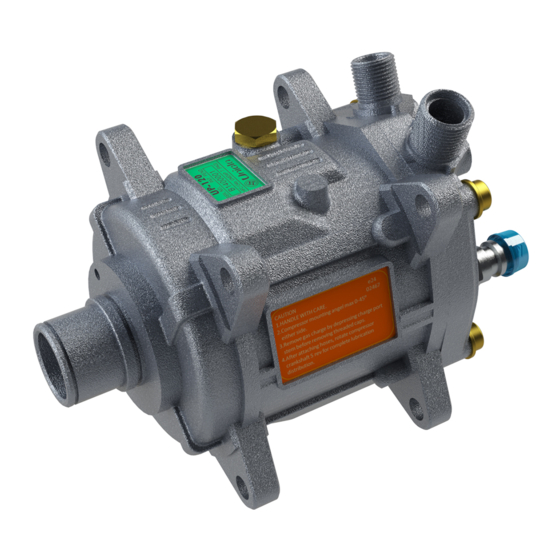
Table of Contents
Advertisement
Quick Links
Advertisement
Table of Contents

Summarization of Contents
Compressor Fitting Information
Removing Transit Gas
Procedure for removing transit gas from a new Unicla UWX compressor before mounting.
Initial Lubrication
Rotating the compressor armature for lubrication to prevent damage during initial start-up.
Service Manual Consultation
Consulting the specific Unicla compressor service manual for disassembly and fitting procedures.
System Cleanliness
Contamination Prevention
Ensuring the system is free from solid particle and chemical contamination before compressor fitting.
System Flushing
Flushing contaminated systems and individual components before fitting a new compressor.
Mounting Procedures
Mounting Points
Details on secure compressor mounting using manufacturers' specifications and minimum lug utilisation.
Mounting Angle Guidelines
Specifying the acceptable mounting angle for each Unicla compressor model.
Lug Type Mounting
Ensuring no gap for UP series lugs to reduce stress and noise transmission.
Belt Alignment and Tension
Belt Alignment
Ensuring perfect alignment of the compressor clutch pulley with drive and auxiliary pulleys.
Belt Tension Adjustment
Adjusting belt tension to be taut but not excessive, with re-checking recommendations.
Compressor Speed Management
Speed Limits
Ensuring compressor speed does not exceed specified continuous and momentary limits.
Pulley Ratio Considerations
Using cut-off sensors for overspeed if excessive pulley ratios are unavoidable.
Compressor Rotation Direction
Matching compressor rotation to application and understanding clutch design variations.
Oil Selection and Management
Recommended Oil and Refrigerant
Using specific Unicla recommended oil and refrigerant to maintain warranty and performance.
Oil Quantity Calculation
Calculating and maintaining correct oil quantity, considering system length and evaporators.
Matching Oil Identity
Ensuring added oil is identical to the native oil installed on the compressor label.
Oil Separator Recommendation
Recommending oil separators for multiple evaporator systems or low suction conditions.
Compressor Selection Criteria
Selection Guidelines
Basic guidelines for compressor selection based on operational speed, system capacity, and refrigerant type.
Hose and Pipe Selection
Suction Line Sizing
Critical sizing of the suction line for adequate refrigerant flow, avoiding compromise by undersized piping.
Suction Line Pipe Size Recommendations
Discharge Line Sizing
Calculating discharge line pipe or hose sizes considering suction line sizes, often one size smaller.
System Validation
Discharge Pressure Analysis
Using a chart to analyze acceptable high side (head pressures) for given ambient conditions.
Thermal Loading Management
Understanding excessive thermal loading and operating within recommended heat ranges.
Other Performance Information
Restricted TX Valves/Orifice Tubes
Impact of restricted TX valves or orifice tubes on compressor cooling under various heat loads.
Poor Condensing Effects
How poor condensing leads to vapour feed and excessive evaporator superheating under high heat loads.
Undersized Suction Line Issues
Consequences of undersized suction lines causing inadequate refrigerant flow and poor compressor cooling.
Contaminated Refrigerants
How contaminated refrigerants reduce compressor cooling, especially with non-condensables.




Need help?
Do you have a question about the 200 Series and is the answer not in the manual?
Questions and answers